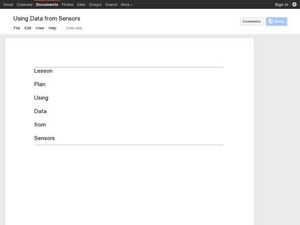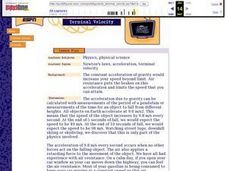Google
Snapchat Geofilter
Sometimes pictures could use a little help. Scholars add filters, frames, stamps, and text to a background photograph. They learn to use variables, encapsulation, sequences, and objects as they use the Blockly programming language.
Curated OER
What Happened to the Chesapeake Bay Filtering System?
For this environmental science lesson, students write a short story about what it's like to help at an oyster garden. They formulate 2 hypotheses on the disappearance of oysters in Chesapeake Bay.
Curated OER
Science: Making Jellyfish
Students examine jellyfish anatomy and estimate the size of the parts on picture cards. They use various supplies, including coffee filters and ribbon to make scale models of jellyfish. Students label all the jelly fish parts and hang...
Curated OER
Water Pollution
Fifth graders study the impact of human activity on water quality and on the ecosystems of Earth. After a discussion on the various ways that water can be polluted, groups of youngsters get together to figure out the best way to clean a...
SRI International
Nanofiltration
How can everyone in the world have access to clean drinking water? Throughout the lesson, learners read about and listen to how water is filtered, what the filtration process removes, and the best ways to filter. They explore the...
Curated OER
Hand Lotion Analysis
Students prepare a sample of a commercial hand lotion for analysis by HPLC to determine the percent composition of two common cosmetic preservatives, methylparaben and propylparaben. They perform the analysis and the data is evaluated to...
Curated OER
Using Data from Sensors
Beginning with a discussion about using technology to collect data, this resource includes a video about the next Mars rover as an example. Young scientists are taught that filtering is necessary before collected data can be analyzed....
Safe Drinking Water Foundation
Make Your Own Water Pollution
Using the polluted water that was made in the prior lesson, your young environmentalists will mix pollutants together in an experiment. Then, they will design a water filter that will clean the polluted water to use in the next lesson....
Exploratorium
Laser Jello
The concepts of refraction and reflection gel with your physical science class during this colorful exploration. Shining lasers through Petri-dish-shaped gelatin desserts, they will notice how the light travels and bounces off the sides....
American Chemical Society
Formation of a Precipitate
Conclude this chemical change unit by having your class combine two liquids that result in formation of a precipitate. The learners discover that chemical reactions result in new materials. Make sure to consider all of the preceding...
Curated OER
Aquatic Science and IPC
Students explain the importance of water in our daily lives. In this aquatic science lesson, students identify different ways to purify water and make it potable. They design and construct a water filter based on researched information.
San Francisco Public Utilities Commission
Recycled Water: A Smart Way to Reuse Water
Learn about wastewater and recycled water with a science reading activity. After learners finish a two-page passage about conserving the water supply, they answer six comprehension questions about what they have read.
Museum of Science
Strawberry DNA
Humans aren't the only ones with DNA—fruit has it too. Using a extraction solution, pupils pull the DNA out of a piece of fruit. Learners crush up a piece of fruit with the solution and filter out the solids. Scholars then add cold...
Purdue University
Yucky Water? No Problem!
Young scholars study the process of water filtration in a three-part STEM lesson. After analyzing samples of dirty water, teams design and build their own filtration systems and measure their efficiency.
Curated OER
What happens to water before we use it?
Learners examine how water is treated prior to becoming available for human consumption. In this water treatment lesson plan, students conduct an experiment in which they filter water. Learners formulate a hypothesis, test, analyze data,...
Curated OER
Terminal Velocity
Students calculate acceleration due to gravity with the measurements of the period of a pendulum or measurements of the time for an object to fall from different heights. They observe and measure the effect of air resistance on the...
PricewaterhouseCoopers
Conservation: Water
Here is a fantastic experiment-based lesson on water conservation, waste, and filtration. The lesson plan is well-developed and provides background information, discussion leads, and six scripted lab activities anyone can do. The class...
Curated OER
Plankton in the Air
Here is a lab activity adequate for use with any full lesson on environmental factors that shape animal adaptations or marine animal characteristics. Pupils will discuss the role plankton plays in the environment and filter-feeding...
Colorado State University
Why Are Compact Fluorescent Bulbs More Efficient?
Compact fluorescent bulbs are the easiest way to increase energy efficiency around the house. But why? Science scholars compare CF bulbs with their incandescent counterparts using a simple test. A solar-powered toy illuminates the...
Curated OER
Does Soil Get Soggy?
Study the properties of soil and water absorption with a science activity. Based on a paragraph with background knowledge on sandy soil, silt, and clay soil, third graders choose which illustration represents a bottle full of sandy soil....
Curated OER
Water Filtration
As an example of nature's water filtering system, young ecologists conduct an experiment in the lab. They construct a funnel out of a plastic bottle, fill it with specified layers of materials that simulate layers of soil, then run muddy...
Royal Society of Chemistry
Chemistry Masterclass—Chemistry Outreach
Immerse your chemistry class in the world of organic chemistry! Science scholars isolate acetaminophen from an over-the-counter sample during an intense and interesting lab. Groups use many different separation and analysis techniques to...
Foundation for Water & Energy Education
What is the Water Cycle? Activity B
Curious physical scientists follow a lesson on the properties of water with this lesson on distillation. They observe a miniature water cycle model that filters dirty water into clean water. These two lessons combined are an enriching...
Curated OER
Classroom Aquaponics: Exploring Nitrogen Cycling in a Closed System
Students investigate nutrient cycling in a simplified desktop ecosystem involving aquarium and hydro-ponically grown plants. They set up an aquarium with 10 gallons of water at least a week before the lab is planned and place...

























